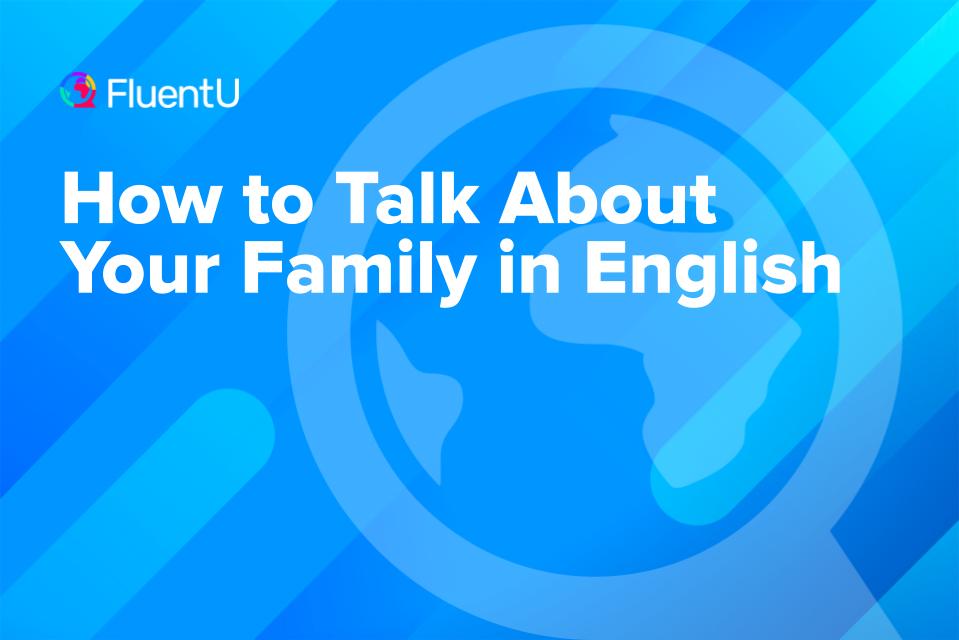How to Talk About Your Family in English

Talking about yourself often leads people to start asking about your family. Just in case that happens, it’s a good idea to have some words and phrases ready.
Here are some general vocabulary terms and phrases in English you’ll need to tell everyone about your family.
Download: This blog post is available as a convenient and portable PDF that you can take anywhere. Click here to get a copy. (Download)
People generally begin a conversation about family with simple phrases like these:
Do you have any family around here?
If that’s the case, you can give a short description that tells the other person how big is your family is and maybe where they live.
Here’s an example:
There are six people in my family—me, my parents, brother and two sisters and we live in…
This gives a general picture of your family and gets the conversation going.
And depending on where that conversation takes you, you’ll want to have the following words in your arsenal!
Terms to Describe Types of Family Structures
You’ll need to be familiar with family structures to accurately describe your family members.
Immediate family—talking about those closest to you
Here are some more questions people usually ask:
Do you have any brothers or sisters?
When people ask these questions, they usually want to know about your immediate family. This means the family closest to you and who may or may not live with you.
| parents | father and mother | wife | female partner through marriage |
| siblings | brothers and sisters | stepfather | your mother's new husband if she remarries |
| children | sons and daughters | stepmother | your father's new wife if he remarries |
| spouse | partner through marriage (any gender) | stepbrother | son of your parent's new spouse; your brother through marriage |
| husband | male partner through marriage | stepsister | daughter of your parent's new spouse; your sister through marriage |
Extended family—discussing other family members related by blood
People might also ask you questions like these:
Do you live with your grandparents?
How often do you see your cousins?
Usually they ask this when they’re interested in finding out about your extended family. Your extended family includes relatives like your grandparents, uncles, aunts and cousins.
| grandparents | grandfather and grandmother | aunt | your parent's sister |
| maternal grandparents | your mother's parents | cousin | your uncle or aunt's child (any gender) |
| paternal grandparents | your father's parents | nephew | male child of your sibling |
| grandchildren | grandsons and granddaughters | niece | female child of your sibling |
| uncle | your parent's brother |
Family by marriage—discussing family related to your spouse
When you marry, your family grows bigger. A question you might hear is:
Does your spouse come from a big family?
After marriage, you now have a new set of relatives from your spouse’s side of the family called your in-laws. The conversation might not go this way, but if it does, you’ll be ready!
| father-in-law | your spouse's father | sister-in-law | your spouse's sister |
| mother-in-law | your spouse's mother | nephew | son of brother- and sister-in-law |
| brother-in-law | your spouse's brother | niece | daughter of your brother- and sister-in-law |
All right, let’s move on to some useful expressions you can use to talk about your family relationships.
Expressions to Describe Your Family
To look like
To look like means to resemble someone physically or to be similar in appearance to someone.
If you’re tall with big eyes like your older sister, you’d say:
To take after
To take after means to look or behave (act) like someone older than you in your family. Some of your family may walk, talk or even smile just like another family member.
So if your father and sister both like to gesture with (move) their hands when talking, you’d say:
My sister takes after my father in the way she waves her hands around when she talks.
To run in the family
To run in the family refers to a quality, ability or skill that’s shared by all or many of your family members. Some families may have lots of members who are good at sports, music, cooking, etc.
It could also be that many of your family members have thick curly hair, so then you’d say:
Thick curly hair runs in my family.
Like father, like son
In many cases, a son’s character or behavior closely resembles (is similar to) that of his father.
For example, if both your father and brother like to spend their money wisely, you’d say:
He spends money like our dad—like father, like son.
Another expression that’s similar in meaning is a chip off the old block. In this expression, the chip refers to a small piece of wood (the son) that’s part of a bigger piece or the block (the father).
So then you’d say:
My brother is a chip off the old block.
Both of the above expressions are generally used when referring to male members of the family.
To have something in common
The expression to have something in common refers to two or more people in a family sharing similar interests, likes and dislikes.
If you’re asked this, you could talk about your shared interests:
What do you and your family like to do?
For example, you could answer:
The opposite of this would be:
To be named after
To be named after someone is to give someone the same name (usually the same first name) as an older family member. This is commonly done in honor and respect for the older person.
For example, this would mean you have the same name as your grandmother:
I was named after my grandmother.
So if your grandmother’s name is Esther, your name would also be Esther.
To get along with
To get along with means to have a good relationship with someone.
If you say this, it means you agree on many things and have a good relationship:
I get along very well with my younger sister.
The opposite would be this, which means the relationship between you and your cousin isn’t very good:
I don’t get along with my cousin.
To be on good terms
To be on good terms also means to have a good relationship with someone.
If you and your sister get along very well, then you’d say:
I’m on good terms with my sister.
The opposite would be:
I’m not on good terms with my cousin.
If you and your cousin are not even talking to each other, you can also say:
I’m not on speaking terms with my cousin.
To be close to
To be close to means that you have a close relationship that cannot easily be broken.
If you say this, you’re saying that you enjoy being with your mother and sister, get along very well and have a strong relationship:
I’m very close to my mother and sister.
To look up to
To look up to means to respect and admire someone else.
If you say this, it means you respect and admire the things your brother says and does:
I’ve always looked up to my older brother.
To get together
To get together means to meet up and do things together.
If someone asks you:
How often do you see your family?
You might say:
We get together every weekend to play soccer, watch a movie or eat pizza.
To start a family
To start a family means to start having children. You might hear your parents ask you:
When are you and your husband/wife going to start a family? I want grandchildren!
Or maybe your brother just sent a text and so you call your best friend saying:
Don’t just memorize these words, though. The best way to learn family vocabulary is to see them used by real English speakers.
You can do that by reading English books, listening to English music or watching English movies. These resources can show you other vocabulary and phrases that you would want to use in daily conversation. They can also describe the situations in which certain expressions or terms are appropriate.
Certain language learning programs can also help you learn everyday phrases in context. One example is FluentU.
FluentU takes authentic videos—like music videos, movie trailers, news and inspiring talks—and turns them into personalized language learning lessons.
You can try FluentU for free for 2 weeks. Check out the website or download the iOS app or Android app.
P.S. Click here to take advantage of our current sale! (Expires at the end of this month.)

So there, now you’re ready to answer any question about your family, whether you’re on that summer vacation or at that weekend barbecue.
The more you practice, the more you can talk freely about your family. And if any of your relatives are about to start their own family, you’ll have more parties to attend and more opportunities to use these words and expressions!
Download: This blog post is available as a convenient and portable PDF that you can take anywhere. Click here to get a copy. (Download)
And One More Thing...
If you like learning English through movies and online media, you should also check out FluentU. FluentU lets you learn English from popular talk shows, catchy music videos and funny commercials, as you can see here:
The FluentU app and website makes it really easy to watch English videos. There are captions that are interactive. That means you can tap on any word to see an image, definition, and useful examples.
For example, when you tap on the word "searching," you see this:
Learn all the vocabulary in any video with quizzes. Swipe left or right to see more examples for the word you’re learning.

FluentU helps you learn fast with useful questions and multiple examples. Learn more.
The best part? FluentU remembers the vocabulary that you’re learning. It gives you extra practice with difficult words—and reminds you when it’s time to review what you’ve learned. You have a truly personalized experience.
Start using the FluentU website on your computer or tablet or, better yet, download the FluentU app from the iTunes or Google Play store. Click here to take advantage of our current sale! (Expires at the end of this month.)










